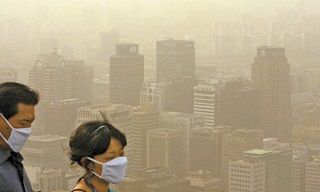OECD says S. Korea has worst air quality among its member states

South Korea has the worst air quality among a group of 35 mostly rich nations, data showed Sunday, posing a health threat to people in one of the world's most densely populated countries.
In South Korea, PM2.5 levels are 27.9 micrograms per cubic meter, the highest level in the Organization for Economic Cooperation and Development (OECD).
In comparison, PM2.5 concentrations are at around 13.9 micrograms per cubic meter on average in OECD countries. The World Health Organization set the guideline limit of 10 micrograms per cubic meter.
PM2.5 a tiny particulate matter small enough to be inhaled into the deepest part of the lungs is monitored in OECD countries because it can harm human health and reduce life expectancy.
Air pollution in urban centers is linked to a range of health problems, from minor eye irritation to upper respiratory symptoms in the short term and chronic respiratory diseases, such as asthma, cardiovascular diseases and lung cancer, in the long term. Children and the elderly may be particularly vulnerable, according to the OECD.
"The percentage of Koreans satisfied with their local water quality has remained broadly stable over the past decade. However, annual exposure to PM2.5 air pollution increased by 4 percent between 2005 and 2013, with this worsening gaining momentum in recent years," according to a "How's Life? 2017" report posted on the website of the OECD.
Air pollution "poses a real threat" to South Koreans, noting some 70 percent of South Korea's population is concentrated in urban areas, particularly near the Seoul metropolitan area.
The OECD said its Environmental Outlook to 2050 projects the number of premature deaths associated with exposure to PM10 and PM2.5 to increase from just over 1 million worldwide in 2000 to about 3.5 million in 2050.
South Korea is followed by Poland and South Africa in terms of poor air quality.
Poland and South Africa saw their PM2.5 levels standing at 22.1 micrograms per cubic meter and 21.6 micrograms per cubic meter, respectively.
Meanwhile, Iceland has the best air quality, with its PM2.5 levels standing at 3 micrograms per cubic meter, according to the OECD.
Article Source: http://english.yonhapnews.co.kr/national/2018/01/07/0302000000AEN20180107002100320.html
Image Source: http://i708.photobucket.com/albums/ww83/craigshields/craigshields001/Dust-in-Korea_zps64512973.jpg
VOCABULARY WORDS:
1. Densely (adv.) ~ in a closely compacted or crowded manner thickly
2. Particulate (n.) ~ relating to or in the form of minute separate particle
3. Inhale (v.) ~ breathe in (air, gas, smoke, etc.)
4. Momentum (n.) ~ the impetus and driving force gained by the development of a process or course of events
5. Worsen (v.) ~ make or become worse
QUESTIONS FOR DISCUSSION:
1. What do you think are the main causes of air pollution in your country?
2. What are the negative effects of air pollution to people's health?
3. What are the possible long-term solutions to air pollution in your country?